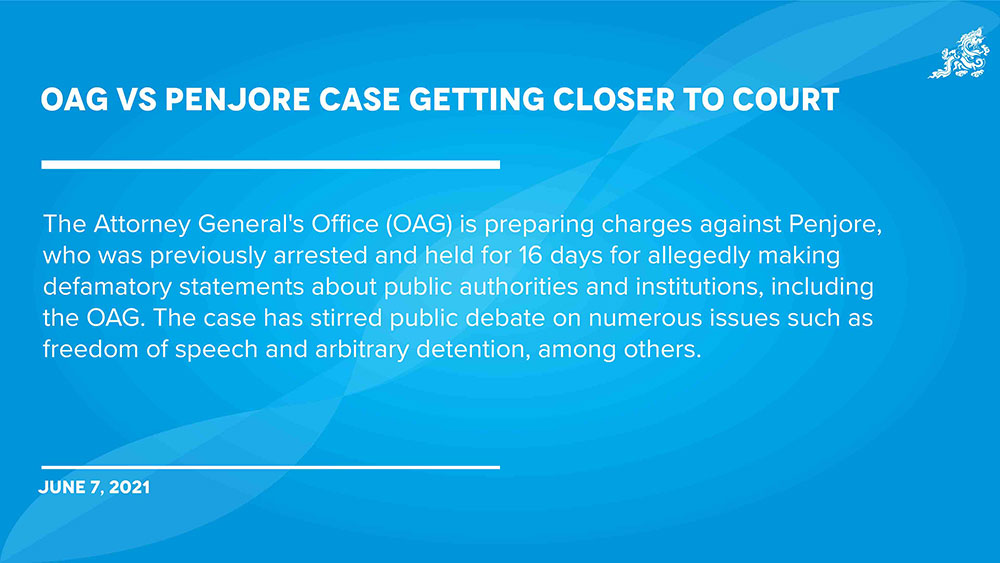The Office of the Attorney General (OAG) is preparing the charges against Penjore who was earlier arrested and detained for 16 days for his allegedly defamatory posts against public officials and institutions including OAG, Kuensel learnt.
Police have submitted their investigation report to the OAG. The issue has stirred public debate on numerous issues such as freedom of speech, and arbitrary detention, among others.
OAG on June 4 issued a three-page press release, a second one related to the issue, clarifying freedom of speech, defamation, arbitrary detention, and whether the OAG can initiate a case.
The press release stated that the defence of freedom of expression to the rapidly emerging field of online defamation in particular whether existent of the conditions of anonymity or without have been gravely misconstrued. “In consequence with the lack of legal awareness on the laws, and limits of laws in our society, it continues to perpetuate communication that sow the seeds of distrust and suspicion on the enforcement of laws in the country, undermining the rule of law and principles of due process and natural justice,” the press release stated.
Taking into cognizance of the fact that freedom of speech is not beyond the scope of laws, it must be subjected to certain restraints to protect and uphold the good reputation, honour, and dignity which is so sacred and dear with a human person both in private and as well as in public life, the OAG press release stated.
“There is no exception to the rule of defamation whether the defamatory comment is made in a real-life situation or libellous comments posted in the virtual world situation through the use of the Internet,” it stated.
The press release further stated that online posts through online anonymity and in-person are often exciting, thrilling, and intimidating but there were consequences to such actions that the public need to be mindful of.
Penjore, who had posted the comments on his Facebook account – Penjore Penjore, maintains that he had not defamed the Attorney General. He said that he had exercised his Constitutional right to freedom of speech and that his article has a ‘larger nation-building element’.
He alleged that following the complaint by the Attorney General, the police arbitrarily arrested and detained him for 16 days. “I don’t know full well exactly why I have been detained,” he said.
He said that police presented him to Thimphu dzongkhag court the day after his arrest for a remand order. “On the third hearing when the Police charge sheet has been submitted to the OAG did they release me.”
The OAG press release stated that the Civil and Criminal Procedure Code expressly prohibits pre-trial detention that extends to 49 days for cases of misdemeanour and below offences and 108 days for serious offences felony third-degree and above. “Thus, the public discourse on the questions and concerns of the arbitrariness of detaining persons such as Penjore are adhering to the due process of law,” it stated.
The former attorney general Damcho Dorji, on his Facebook page, stated that since the alleged defamation by Penjore does not involve murder, armed robbery, terrorism or treason, it did not fall under felony of fourth-degree but falls under a petty misdemeanour.
“Petty misdemeanour is a compoundable offence meaning the offender does not need to undergo imprisonment but can pay a fine instead. But if Penjore is already detained for weeks before he gets bail from the Court, it defeats the whole purpose of the law giving a lighter sentence of a petty misdemeanour which is compoundable, as opposed to mandatory imprisonment for felonious defamation,” it stated.
He said that the problem with this dilemma lies in the fact that the police cannot give bail to an accused without a warrant from the court and the court cannot give bail to an accused until the case is charged before it.
He said that while the police would need time to investigate the case, it could be done without the accused being physically present under detention.
“As long as the alleged offence is not a felony, the court has the power to suo motto grant bail under Section 199.4 of the CCPC 2001, which applies to both pre-trial investigation by the police as well as during trial before the court, if the accused so applies,” he stated.
Staff Reporter


